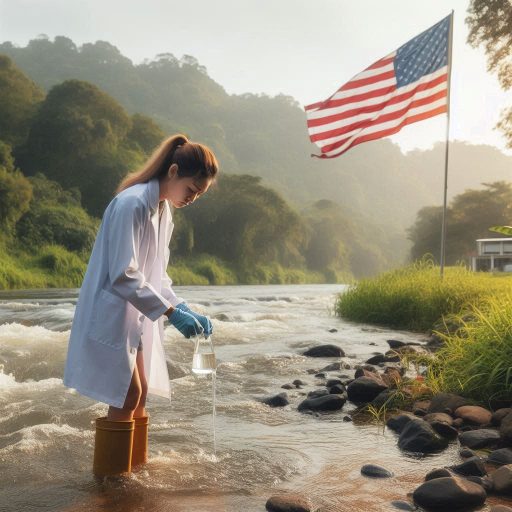Introduction
Finding mentors in the hydrology field is essential for personal and professional growth.
Mentors provide guidance, support, and valuable insights into career development.
They can help you navigate challenges, expand your network, and refine your skills.
However, individuals often face challenges when seeking mentors in hydrology.
One significant obstacle is the lack of established mentorship programs in many organizations.
This gap can make it difficult for newcomers to connect with experienced professionals.
Some individuals may feel intimidated when approaching potential mentors, fearing rejection or judgment.
Another challenge is identifying the right mentor.
Each person’s career goals and interests are unique, so finding someone who aligns with your aspirations is crucial.
Individuals may struggle to find mentors with relevant expertise or those who understand the specific challenges in hydrology.
Despite these challenges, perseverance is key.
Building relationships through networking events, conferences, and professional organizations can help you find potential mentors.
Engaging in online communities and forums related to hydrology can also lead to meaningful connections.
By actively seeking mentorship opportunities, you can enhance your knowledge and advance your career in the hydrology field.
Mentorship plays a vital role in fostering the next generation of hydrologists.
Understand the role of a mentor in the hydrology field
Understanding Mentorship in Hydrology
A mentor is an experienced professional who offers guidance and support to less experienced individuals.
Mentors share their knowledge and insights, helping mentees navigate their career paths.
In hydrology, mentorship can be particularly valuable due to the complexity and interdisciplinary nature of the field.
Importance of Having a Mentor
Having a mentor is crucial for guiding professional growth.
Mentors provide invaluable advice on navigating career challenges and opportunities.
They help mentees identify their strengths and weaknesses, fostering self-awareness.
Through constructive feedback, mentors enable mentees to develop essential skills for success in hydrology.
Mentors also serve as role models, demonstrating best practices in the field.
Observing a mentor‘s professional conduct helps mentees understand workplace dynamics.
This insight prepares them for real-world challenges in hydrology and related disciplines.
Furthermore, mentors can introduce mentees to industry standards and ethical practices, which are essential in scientific research.
Benefits of Mentorship in the Hydrology Field
The benefits of having a mentor in hydrology are significant and far-reaching.
First, mentors can expand professional networks.
They often have established connections in academia, government, and industry.
These connections can lead to job opportunities, collaborations, and internships, which are vital for career advancement.
Second, mentors provide access to specialized knowledge and resources.
The hydrology field encompasses various sub-disciplines, including water quality, hydrodynamics, and climate impact studies.
A mentor can guide mentees in choosing relevant courses or research projects that align with their career goals.
This tailored guidance enhances academic and professional development.
Third, mentors can help mentees navigate the complexities of funding and grant applications.
Many hydrology projects rely on external funding sources for research.
An experienced mentor can offer insights into securing grants and managing budgets effectively.
This knowledge is critical for those pursuing research positions or academic careers in hydrology.
Mentors can assist mentees in developing a robust resume and effective interview skills.
They can provide feedback on application materials and conduct mock interviews.
This preparation boosts mentees’ confidence and enhances their chances of securing desirable positions.
Finally, mentorship fosters a supportive environment where mentees feel encouraged to pursue their passions.
Having a mentor who believes in their potential can motivate mentees to overcome challenges and reach their goals.
This supportive relationship contributes to overall job satisfaction and long-term career success.
Finding a mentor in the hydrology field is essential for professional growth.
Mentors provide guidance, support, and access to valuable networks and resources.
They help mentees navigate the complexities of their careers and develop essential skills.
By seeking mentorship, individuals in hydrology can enhance their knowledge, build professional connections, and ultimately achieve their career aspirations.
Building a strong mentor-mentee relationship is a critical step toward success in this dynamic and impactful field.
Identify potential mentors in the hydrology field
Look Within Your Professional Network
Finding a mentor in the hydrology field often starts with your existing professional network.
Reach out to professors, colleagues, or supervisors you trust.
They may provide valuable insights and introductions to potential mentors.
Identify individuals whose careers you admire and who have experience in hydrology.
Consider their expertise, accomplishments, and willingness to guide others.
Ask for recommendations from your network to expand your search for mentors.
Don’t hesitate to approach former professors or classmates.
They may be working in the hydrology field and can share their experiences.
A shared educational background can create a solid foundation for building a mentoring relationship.
Also, join professional organizations related to hydrology.
Membership often connects you with established professionals eager to share their knowledge.
These organizations can offer resources, networking opportunities, and events that facilitate mentor-mentee relationships.
Attend Conferences and Networking Events
Conferences and networking events provide excellent opportunities to meet potential mentors in hydrology.
These gatherings often feature leading experts discussing their work and insights.
Attend sessions, workshops, and panel discussions to learn about recent developments in the field.
Engage with speakers and attendees during breaks or social events.
Approach them with thoughtful questions about their work and experiences.
Express genuine interest in their research and ask for advice on career development.
Participating in networking events allows you to connect with like-minded professionals.
Share your interests and career aspirations, which may attract mentors who resonate with your goals.
Building rapport with attendees can lead to lasting professional relationships.
Consider volunteering at conferences.
Volunteering positions you among professionals in the field.
It also demonstrates your commitment to the hydrology community, increasing your chances of finding a mentor.
Utilize Online Platforms Such as LinkedIn
Online platforms like LinkedIn offer valuable resources for finding mentors in hydrology.
Start by updating your profile to reflect your interests and expertise.
A well-crafted profile can attract potential mentors who share your professional goals.
Search for hydrology professionals on LinkedIn using relevant keywords.
Review their profiles to assess their experience and background.
Follow experts whose work aligns with your interests, and engage with their content.
Send personalized connection requests to professionals in hydrology.
Introduce yourself and explain your interest in their work.
Mention any mutual connections or shared interests to establish rapport.
Once connected, initiate conversations by asking for advice or insights.
Be respectful of their time and express gratitude for any assistance they provide.
Building a genuine relationship takes time, so be patient and persistent.
Finding mentors in the hydrology field requires a proactive approach.
Start by looking within your professional network, seeking recommendations, and engaging with trusted colleagues.
Attend conferences and networking events to meet experts and build rapport.
Utilize online platforms like LinkedIn to connect with professionals in the hydrology community.
Update your profile, engage with relevant content, and send personalized connection requests.
By actively pursuing mentorship opportunities, you can gain valuable insights and guidance to advance your hydrology career.
Mentorship plays a vital role in personal and professional growth.
By seeking mentors, you can enhance your knowledge, develop skills, and navigate your career path effectively.
Embrace these strategies to find the right mentors who can support your journey in hydrology.
Read: Continuous Learning: Post-graduate Options for US Biologists
Reaching out to potential mentors
Crafting a Personalized Message
Finding a mentor in the hydrology field can significantly impact your career development.
Start by researching professionals whose work resonates with your interests.
Identify hydrologists whose projects or research align with your goals.
Once you have a list, craft a personalized message for each potential mentor.
In your message, introduce yourself and explain your background.
Mention your current studies, projects, or work experiences related to hydrology.
Highlight specific aspects of their work that inspire you.
This shows that you have done your homework and genuinely appreciate their contributions to the field.
For example, you might say, ‘I am currently studying water resource management and am fascinated by your research on groundwater sustainability‘.
A personalized message demonstrates your commitment and increases the likelihood of a positive response.
Being Clear About Your Goals
After crafting your personalized message, be clear about what you hope to gain from the mentorship.
Outline your specific objectives and how the mentor‘s expertise aligns with your goals.
This clarity will help them understand how they can assist you.
For instance, you might say, ‘I seek guidance on developing my research skills in hydrology‘.
You can also express interest in learning about their career path and gaining insights into industry trends.
Being upfront about your goals shows that you value their time and expertise.
clarify how you envision the mentorship relationship.
Do you seek regular meetings, occasional emails, or informal chats? By providing this information, you help set realistic expectations for both you and your potential mentor.
Requesting a Meeting or Phone Call
Once you have crafted a personalized message and clarified your goals, request a meeting or phone call.
Suggest a few times that work for you and ask if they have availability.
This makes it easier for them to respond positively.
For example, you might say, ‘Would you be open to a 30-minute phone call next week?‘ This direct approach shows initiative and respect for their time.
If they agree, prepare for the meeting by developing a list of questions.
Focus on areas where you can learn from their experience.
Be sure to express gratitude for their willingness to connect.
Acknowledging their time and effort reinforces a positive impression.
Regardless of the outcome, maintaining professionalism throughout the interaction is essential.
Finding a mentor in the hydrology field involves crafting a personalized message, being clear about your goals, and requesting a meeting.
By taking these steps, you demonstrate your commitment to your career and your respect for potential mentors‘ time.
Mentorship can provide valuable insights, guidance, and support as you navigate your career in hydrology.
Remember that successful mentoring relationships often stem from genuine connections.
Approach potential mentors with sincerity and enthusiasm.
You can create meaningful relationships that enhance your professional journey in hydrology by doing so.
Read: Key Roles and Responsibilities of a Chemist in the US
Establish a mentorship relationship
Setting Clear Goals and Expectations for Mentorship
Finding a mentor in the hydrology field begins with setting clear goals.
Identify what you hope to achieve through mentorship.
Whether you seek career guidance, technical skills, or networking opportunities, clarity is crucial.
Consider specific areas of hydrology that interest you, such as water resource management or hydrological modeling.
Communicate your goals to potential mentors early in the relationship.
Discuss how you envision their guidance helping you reach your objectives.
This conversation sets the foundation for a productive partnership.
Establishing mutual expectations ensures both you and your mentor are on the same page.
It‘s also beneficial to outline the scope of your mentorship.
Discuss how often you would like to meet and in what format.
Whether through regular emails, video calls, or in-person meetings, consistency fosters a strong relationship.
Additionally, be flexible to accommodate your mentor‘s schedule and commitments.
Maintaining Regular Communication with Your Mentor
Regular communication is vital in any mentorship relationship.
Schedule check-ins to discuss progress and address any challenges.
This consistency reinforces your commitment to learning and growth.
Prepare questions or topics for discussion ahead of time to make the most of your meetings.
Utilize various communication channels to stay connected.
Use email for quick updates and share relevant articles or resources.
Platforms like LinkedIn can also facilitate professional networking and keep your mentor informed about your achievements.
Remember that mentorship is a two-way street.
Show appreciation for your mentor‘s time and insights.
Express gratitude after meetings, and follow up on discussions.
A simple thank you can strengthen your bond and encourage ongoing support.
Being Open to Feedback and Willing to Learn
Being open to feedback is essential for a successful mentorship experience.
Approach discussions with a growth mindset, ready to embrace constructive criticism.
Your mentor has valuable experiences and insights that can enhance your development.
Ask for specific feedback on your work or projects, and demonstrate your willingness to improve.
This openness builds trust and shows your mentor that you value their perspective.
When receiving feedback, listen actively and avoid becoming defensive.
Learn from your mentor‘s experiences.
They have navigated similar challenges and can offer practical advice.
Engage in discussions about their career path and the lessons they‘ve learned.
This dialogue can provide invaluable insights into the hydrology field.
Furthermore, seek opportunities to apply your mentor’s advice in real-world scenarios.
Implement their suggestions in your projects or studies.
This proactive approach demonstrates your commitment to learning and reinforces the mentorship relationship.
In essence, finding a mentor in the hydrology field requires intentionality and effort.
Setting clear goals and expectations creates a solid foundation for mentorship.
Maintaining regular communication keeps the relationship dynamic and productive.
Being open to feedback and learning from your mentor‘s experiences fosters personal and professional growth.
By actively engaging with your mentor, you can navigate the complexities of the hydrology field more effectively.
Embrace this opportunity to build a valuable connection that can shape your career.
As you progress, remember that mentorship is an ongoing journey that can enrich your understanding of hydrology.
With dedication and open-mindedness, you can maximize the benefits of this invaluable relationship.
Read: Earning Potential: Chemist Salaries Across US States

Learn from your mentor’s experiences in the hydrology field
Ask for Advice on Career Development
Start by seeking advice on career development.
Identify professionals whose careers you admire and reach out to them.
Attend conferences and workshops to meet experienced hydrologists.
These events offer excellent networking opportunities and facilitate meaningful connections.
When approaching potential mentors, be specific about your career goals.
Explain what you hope to achieve and how their experience aligns with your aspirations.
Most professionals appreciate being asked for their insights and will be willing to help.
Utilize platforms like LinkedIn to connect with hydrology professionals.
Join relevant groups and participate in discussions to engage with potential mentors.
Be proactive in reaching out and expressing your interest in their work.
Seek Guidance on Technical Skills and Industry Trends
Technical skills are crucial in hydrology, and mentors can provide valuable guidance.
Look for mentors who excel in areas you wish to develop, such as GIS, hydrological modeling, or data analysis.
Ask for advice on the most relevant skills to acquire.
They can recommend online courses, workshops, or certifications that enhance your expertise.
By focusing on essential skills, you increase your employability and knowledge in the field.
Inquire about industry trends and emerging technologies in hydrology.
Mentors often have firsthand experience with the latest advancements and can share insights.
Understanding current trends can help you stay competitive and informed.
Take Advantage of Job Shadowing Opportunities
Job shadowing offers a unique opportunity to gain hands-on experience in the field.
Reach out to potential mentors and express your interest in shadowing them during their work.
This experience can provide invaluable insights into their daily tasks and responsibilities.
Participating in job shadowing helps you understand the practical applications of hydrology concepts.
You can observe how professionals tackle real-world challenges and make informed decisions.
This experience can deepen your understanding of the field and clarify your career goals.
Inquire about internships or research projects where you can work alongside experienced hydrologists.
These opportunities provide practical experience while allowing you to build relationships with mentors.
Finding a mentor in the hydrology field can profoundly influence your career trajectory.
Seek advice on career development, technical skills, and industry trends.
Take advantage of job shadowing opportunities to gain hands-on experience and learn from professionals.
By actively engaging with experienced hydrologists, you can create meaningful connections.
A mentor can provide invaluable guidance, helping you navigate the complexities of your career.
Remember, the key to finding a mentor lies in being proactive, open, and genuinely interested in their work.
Your future in hydrology will benefit immensely from their insights and support.
Read: Top Chemistry Departments and Schools in the US
Transform Your Career Today
Unlock a personalized career strategy that drives real results. Get tailored advice and a roadmap designed just for you.
Start NowShow appreciation for your mentor’s support and guidance
Expressing Gratitude for Time and Wisdom
Finding a mentor in the hydrology field is an invaluable step in your career.
Once you establish a mentoring relationship, it‘s essential to express gratitude for their time and wisdom.
A simple thank-you note can go a long way in showing appreciation.
Acknowledge the specific advice they provided and how it influenced your path.
You can also express gratitude through small gestures.
For instance, consider inviting your mentor to a coffee chat or a lunch meeting.
Sharing your experiences over a meal can deepen your connection and show your appreciation.
Acknowledging their impact on your career helps reinforce a positive mentor-mentee relationship.
Furthermore, actively listen during your discussions.
Showing genuine interest in their insights conveys respect for their knowledge.
When you implement their advice, let them know how it has benefited you.
This approach reinforces the value of their guidance and strengthens your bond.
Keeping Mentors Updated on Progress and Achievements
Once you have established a rapport with your mentor, keep them updated on your progress and achievements.
Regular updates foster an ongoing relationship and demonstrate your commitment to growth.
Send them occasional emails sharing your latest accomplishments or new projects.
Consider highlighting specific skills or knowledge you gained from their mentorship.
For example, if you applied their advice during a project, mention how it contributed to your success.
Sharing these details encourages your mentor to invest further in your development.
Invite them to important events in your career, such as presentations or workshops.
Their presence at these events can provide valuable support and enhance your confidence.
It also gives them a chance to see your growth firsthand.
Paying It Forward by Mentoring Others
As you progress in your career, consider paying it forward by mentoring others in the future.
Reflect on the support you received and how it shaped your journey.
You can make a difference by sharing your knowledge and experiences with newcomers in the hydrology field.
Start by offering guidance to interns or junior colleagues in your workplace.
Share valuable resources, insights, and encouragement.
Your mentorship can help them navigate their paths effectively.
By providing support, you contribute to a culture of collaboration and growth within the field.
Moreover, consider participating in formal mentoring programs.
Many professional organizations offer initiatives to connect experienced professionals with emerging talent.
Engaging in these programs expands your network while giving back to the community.
In summary, finding mentors in the hydrology field can significantly impact your career.
Expressing gratitude for their time and wisdom strengthens your relationship.
Keeping them updated on your progress shows your commitment to growth.
By paying it forward and mentoring others, you contribute to the field’s future.
These actions create a supportive environment where knowledge and experiences are shared.
Together, we can foster a thriving hydrology community that nurtures the next generation of professionals.
Evaluate and reflect on the mentorship experience
Impact of the Mentorship on Your Career Development
Finding a mentor in the hydrology field can significantly impact your career development.
Mentors provide guidance, knowledge, and support that can shape your professional journey.
Start by reflecting on your mentorship experience.
Consider how your mentor’s insights have influenced your skills and decision-making.
Evaluate specific instances where your mentor’s advice helped you overcome challenges.
Did their guidance lead to new opportunities or enhance your understanding of hydrology? By assessing these impacts, you can appreciate the value of mentorship in your growth.
Take note of any skills you developed or projects you excelled in due to your mentor’s influence.
Recognizing these achievements highlights the positive role your mentor played in your development.
This reflection helps solidify the importance of mentorship as you progress in your career.
Areas of Growth and Improvement
Identifying areas for growth and improvement is crucial for continued success in hydrology.
Reflect on your skills and experiences with your mentor.
What areas did you struggle with, and how did your mentor assist you?
Consider the feedback your mentor provided during your meetings.
Did they suggest specific skills to enhance or new topics to explore? Take this feedback seriously and create a list of areas for improvement.
Prioritize these areas based on your career goals and interests in hydrology.
Engaging in self-assessment can also help identify gaps in your knowledge or experience.
Use tools like SWOT analysis to evaluate your strengths, weaknesses, opportunities, and threats.
This analysis allows you to create a focused plan for your growth.
Seek feedback from peers and colleagues in the hydrology field.
They can provide valuable insights into your strengths and areas that require improvement.
This feedback helps you gain a broader perspective on your development.
Use the Lessons Learned to Continue Growing in Your Career in the Hydrology Field
Utilizing the lessons learned from your mentorship is essential for continued growth.
Implement the skills and strategies your mentor taught you in your daily work.
This application reinforces your learning and enhances your expertise in hydrology.
Set specific, measurable goals based on your mentor‘s guidance.
For example, if your mentor encouraged you to develop your research skills, commit to conducting a research project.
Establish timelines and milestones to track your progress.
Stay curious and open to new experiences.
Attend workshops, webinars, or conferences related to hydrology.
Engaging in continuous learning opportunities allows you to build on your knowledge and network with other professionals.
Seek additional mentors as you advance in your career.
Different mentors can provide diverse perspectives and insights.
These new relationships can further enrich your understanding of the hydrology field.
Moreover, share your experiences and lessons learned with others.
Mentoring someone else not only benefits them but reinforces your own knowledge.
Teaching others can solidify your understanding and open new avenues for professional growth.
In closing, finding a mentor in hydrology can profoundly impact your career.
Assess the influence of mentorship on your development, identify areas for growth, and apply what you’ve learned.
By doing so, you will continue to thrive and make meaningful contributions to the hydrology field.
Embrace the journey of learning and growth, and inspire others along the way.
See Related Content: Astronomers vs. Astrophysicists: Key Differences
You Might Also Like: Exploring Soil Biodiversity with Soil Scientists
Discover More: How Geologists Study Earthquakes and Fault Lines
Conclusion
This post recapped the importance of finding mentors in the hydrology field.
Mentors provide invaluable guidance, support, and insights that can shape your career.
They help you navigate challenges, enhance your skills, and build professional networks.
Establishing relationships with experienced professionals can significantly impact your growth in hydrology.
Mentorship can lead to new opportunities, collaborations, and career advancements.
We encourage you to actively seek mentorship opportunities.
Attend conferences, workshops, and networking events to connect with potential mentors.
Reach out to professors, colleagues, or professionals whose work inspires you.
Don’t hesitate to initiate conversations and express your interest in learning from them.
Building these relationships requires effort and openness, but the rewards are worth it.
Remember to pay it forward by mentoring others in the future.
As you gain experience and knowledge, support newcomers in the field.
Sharing your insights and guidance can make a significant difference in someone else’s journey.
Fostering a culture of mentorship enriches the hydrology community and promotes professional growth.
By valuing mentorship, you contribute to a supportive environment for all hydrologists.
Embrace the journey of finding mentors and become a mentor yourself to inspire the next generation.
[E-Books for Sale]
The Big Book of 500 High-Paying Jobs in America: Unlock Your Earning Potential
$19.99 • 500 High-Paying Jobs • 330 pages
Explore 500 high-paying jobs in America and learn how to boost your career, earn more, and achieve success!
See All 500 High-Paying Jobs of this E-Book
1001 Professions Without a Degree: High-Paying American Jobs You Can Start Now
$19.99 • 1001 Professions Without a Degree • 174 pages
Discover 1001 high-paying jobs without a degree! Unlock career tips, skills, and success strategies for just $19.99!




